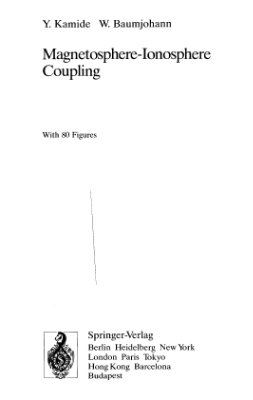Springer, Berlin, 1993, 175 Pages
In the past two decades a succession of direct observations by satellites, and of extensive computer simulations, has led to the realization that the polar ionosphere plays a principal role in large-scale magnetospheric processes - a manifestation of the physics linkage involved in solar-terrestrial interactions. Spatial/temporal variations in high-latitude electromagnetic phenomena, such as dynamic aurorae, electric fields and currents, have proved to be extremely complex. Now the challenge is to comprehend the vast amount of complicated measurements made in this magnetosphere-ionosphere sysstem of the Earth. This book addresses the electrical coupling between the hot, but dilute, magnetospheric plasma and the cold, but dense, plasma in the ionosphere.
In five major chapters, this book presents: - basic properties of magnetosphere-ionosphere coupling; - morphology of electric fields and currents at high latitudes; - global modeling of magnetosphere-ionosphere coupling; - modeling of ionospheric electrodynamics; - current issues, such as auroral particle acceleration, substorms, penetration of high-latitude fields into low latitudes.
In the past two decades a succession of direct observations by satellites, and of extensive computer simulations, has led to the realization that the polar ionosphere plays a principal role in large-scale magnetospheric processes - a manifestation of the physics linkage involved in solar-terrestrial interactions. Spatial/temporal variations in high-latitude electromagnetic phenomena, such as dynamic aurorae, electric fields and currents, have proved to be extremely complex. Now the challenge is to comprehend the vast amount of complicated measurements made in this magnetosphere-ionosphere sysstem of the Earth. This book addresses the electrical coupling between the hot, but dilute, magnetospheric plasma and the cold, but dense, plasma in the ionosphere.
In five major chapters, this book presents: - basic properties of magnetosphere-ionosphere coupling; - morphology of electric fields and currents at high latitudes; - global modeling of magnetosphere-ionosphere coupling; - modeling of ionospheric electrodynamics; - current issues, such as auroral particle acceleration, substorms, penetration of high-latitude fields into low latitudes.

